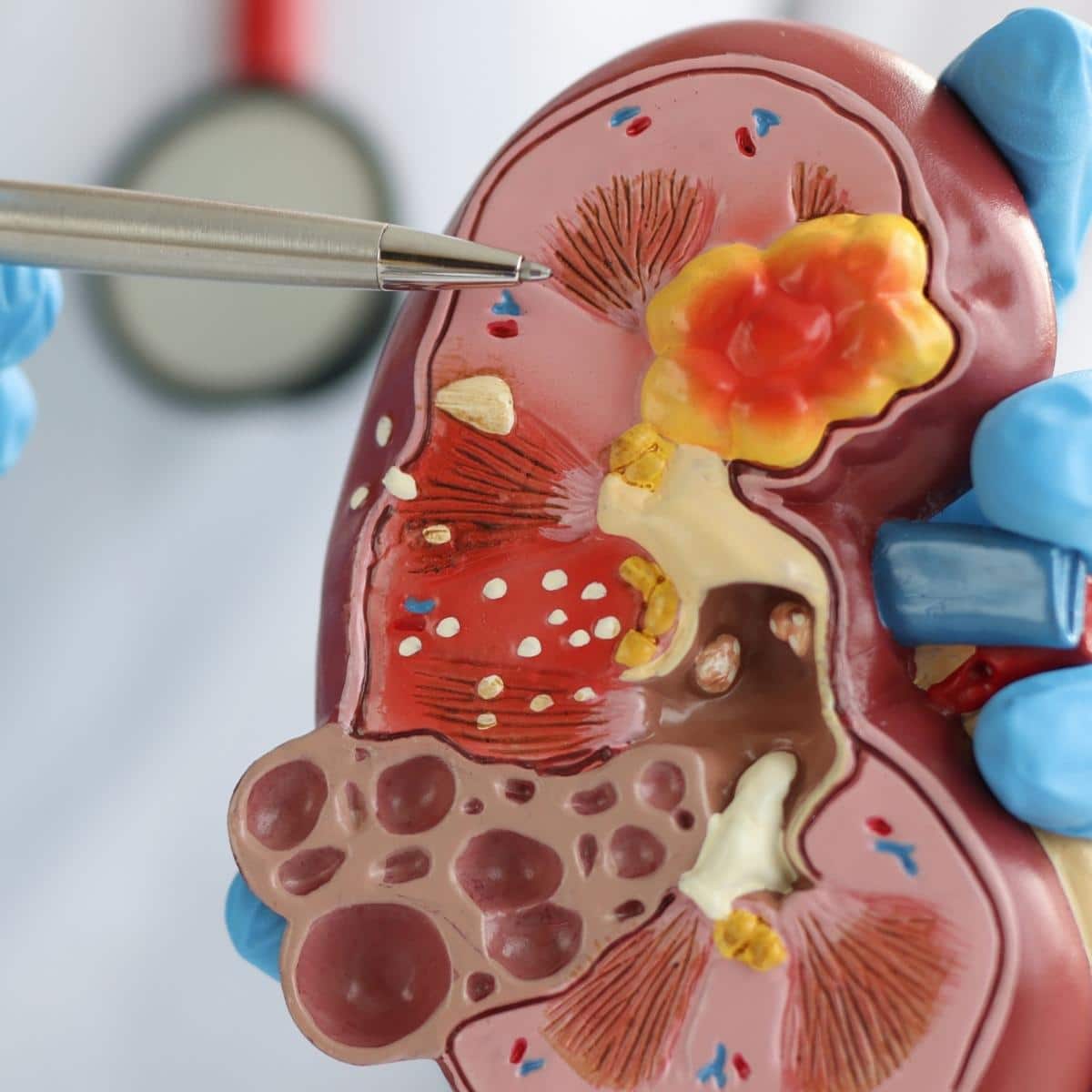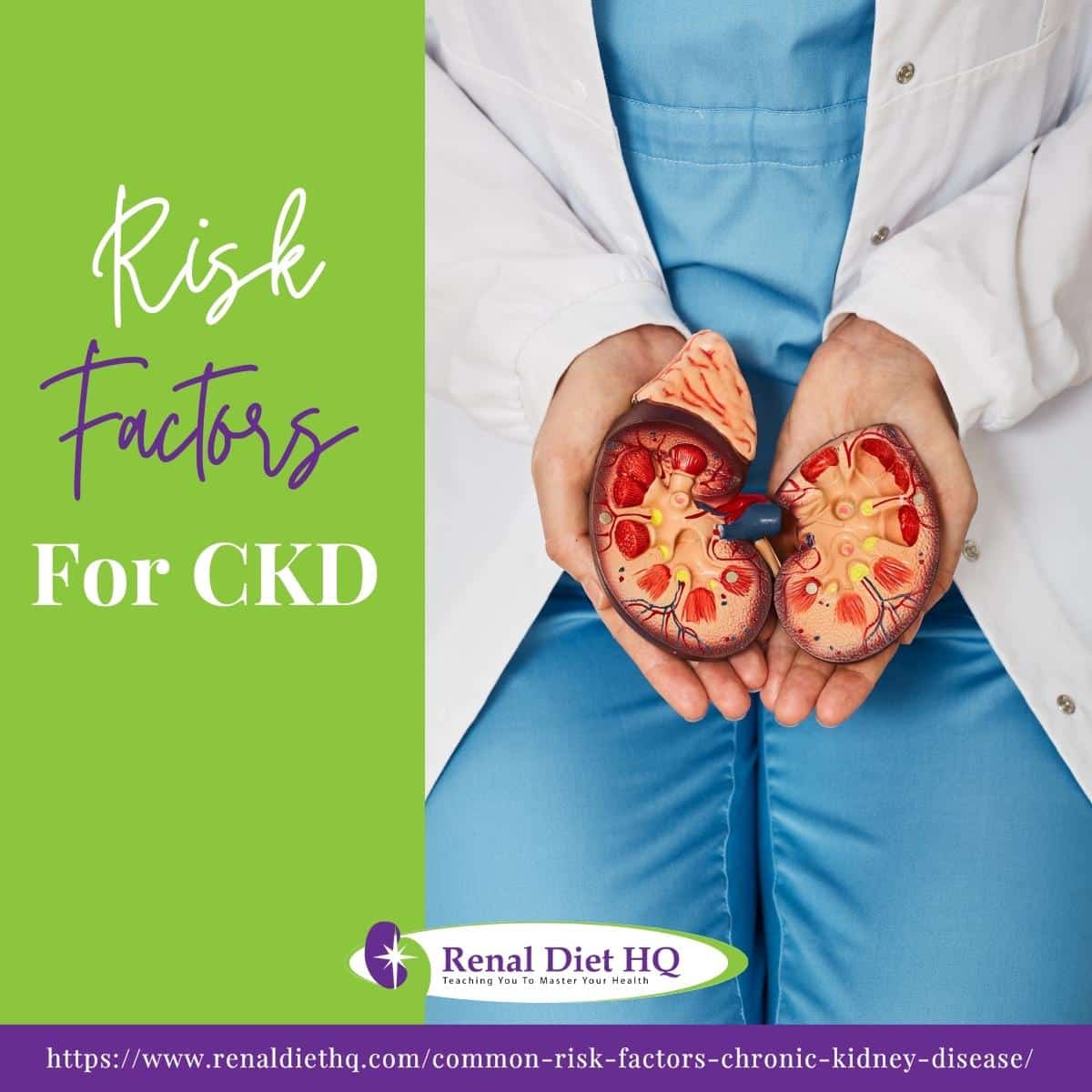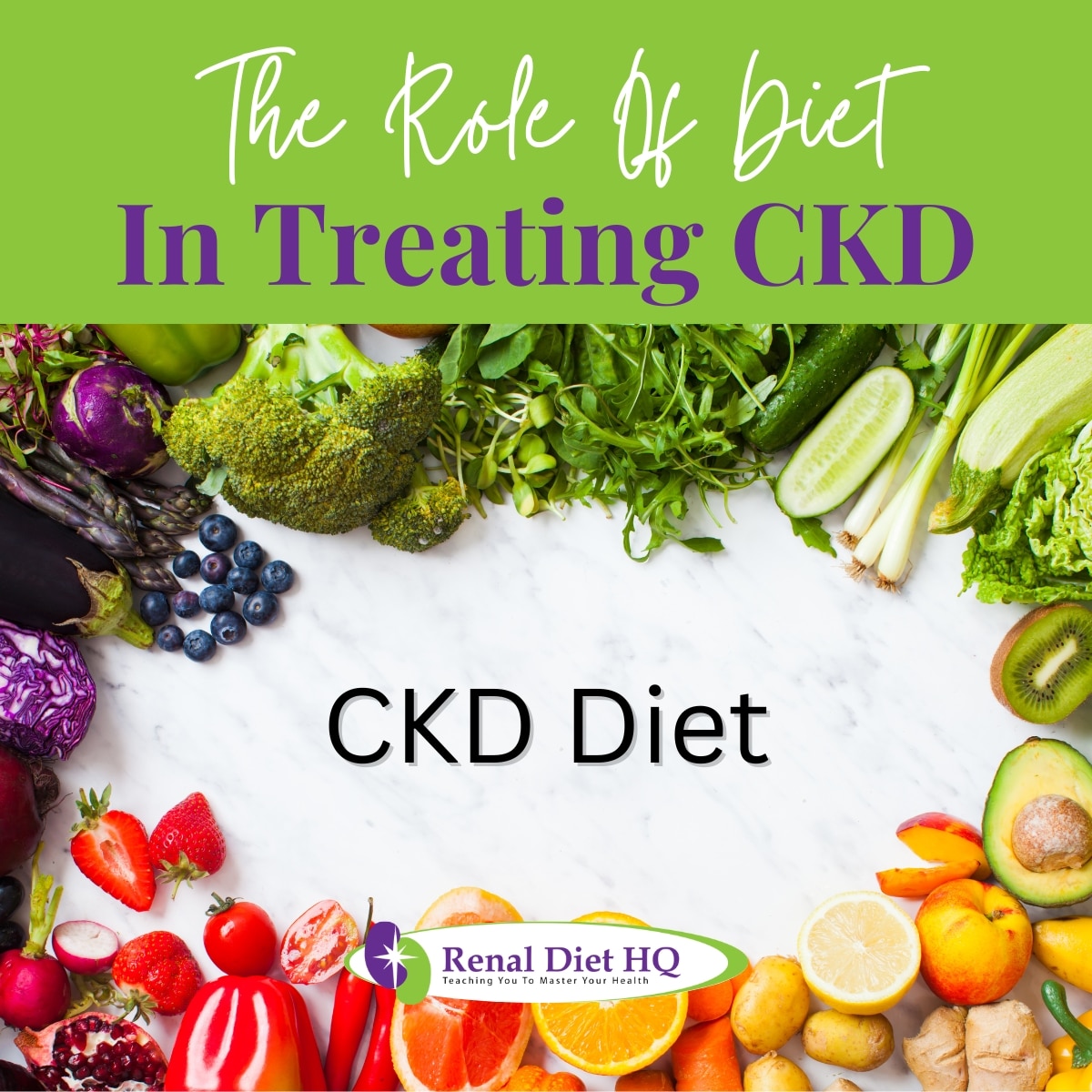Risk Factors For CKD
If you have chronic kidney disease (CKD) or if you're passionate about helping others, knowing more about how this disease develops is a great start. CKD affects millions worldwide and understanding its risk factors can help in prevention and early intervention.
As with just about any chronic illness, there are certain that can make developing CKD more likely. These risk factors can also contribute to the progression of your illness to End-Stage Renal Disease. Understanding your own health risks is the best way to start your journey to a healthier you, even with CKD and a CKD Diet plan.

Wondering about managing your kidney disease? Age, race, overall health condition, gender, and family history play critical roles. People over 65, women, and individuals of Asian, Black or Latino descent are more susceptible. Metabolic diseases like high blood pressure and diabetes could also raise your risk of kidney disease. Even your lifestyle choices matter, poor diet choices and lack of exercise don't do any favors for your kidneys.
But there's hope! Regular check-ups, maintaining a healthy lifestyle, following doctor's instructions diligently and sticking to a renal-friendly diet can improve symptoms significantly. Getting informed is the first step to making a difference in your life or someone else's!
Jump to:
- Key Takeaways
- Understanding the Connection Between Age and CKD
- The Role of Race in CKD Risk
- How Overall Health and Metabolic Diseases Contribute to CKD
- Gender Differences in CKD Occurrence
- The Impact of Family History on CKD Risk
- Lifestyle Choices and Their Effect on CKD Development
- The Importance of Information and Regular Testing in CKD Management
- The Role of Diet in Treating CKD
- How a Healthy Lifestyle Can Improve CKD Symptoms
- The Importance of Appropriate Follow-Up in CKD Management
- FAQs for Common Risk Factors for CKD
- Managing Risk Factors Can Protect You From Chronic Kidney Disease
Key Takeaways
- Risk factors for chronic kidney disease (CKD) include age, race, overall health, gender, family history, and lifestyle factors.
- Diet plays a significant role in the treatment of CKD.
- Living a healthy lifestyle, including avoiding excessive alcohol consumption and smoking, is important for managing the disease and slowing the progression to End-Stage Renal Disease.
- Regular checkups and following healthcare providers' instructions are essential for early detection and appropriate management of CKD.
For More Recipes and Ideas --->> Get Your Free Meals and Recipes That Are Perfect for Pre-Dialysis Diets, Pre-Dialysis with Diabetes, or Dialysis Diets.
Understanding the Connection Between Age and CKD
As you age, it's crucial to understand that your risk for chronic kidney disease (CKD) increases, especially after 65. This is because the aging process naturally brings about changes in kidney function that can lead to CKD.
With age comes many physiological changes in the kidneys such as decreased renal blood flow and loss of kidney tissue. The impact of aging on CKD progression can't be underestimated; these age-related changes exacerbate any existing kidney damage, making CKD more likely as you get older.
But even with the link between CKD and aging, don't feel helpless! You can keep your kidneys healthy by staying informed and adopting proactive measures like maintaining a balanced diet and regular exercise. Consult with your doctor about other potential preventative steps tailored to your health needs.
Regular checkups and a healthy lifestyle are key in managing this condition. Remember, managing CKD in older adults is not just about treatment—it's also about prevention. Be diligent about understanding your risks so you can make the best choices for your health without fear or uncertainty.

The Role of Race in CKD Risk
It's a sobering reality that individuals of certain racial backgrounds, like Asians, Blacks, and Latinos, might be more predisposed to encountering the trials of CKD. This increased risk could be brought about by a blend of genetic factors, socioeconomic status, and by cultural influences:
Genetic factors: Certain genetic traits common among specific racial groups may increase their susceptibility to CKD.
Socioeconomic status also plays its part. Lower economic tiers may lead to limited access to healthy food choices or limited access to healthcare.
Cultural influences: Dietary habits or lifestyle practices prevalent in particular cultures could contribute to higher incidences of conditions like hypertension or diabetes, which are catalysts for kidney damage.
So yes, your race does factor into your risk profile for CKD. But don't let this overwhelm you; instead, use it as motivation to take proactive steps towards managing any potential risks better. Regular checkups are crucial, early detection paves the way for effective intervention and management strategies.
How Overall Health and Metabolic Diseases Contribute to CKD
It's important to understand how metabolic diseases can contribute as major risk factors for CKD.
| Metabolic Disease | Relationship with CKD |
| Diabetes | High blood sugar levels in people with diabetes can damage kidneys over time, leading to CKD. |
| Hypertension | High blood pressure can harm kidney blood vessels, impairing their function and eventually causing CKD. |
| Obesity | Obesity is linked to both diabetes and hypertension, making it a significant contributor to CKD. |
| High cholesterol | High cholesterol can make kidney problems more likely. |
In addition to metabolic diseases, smoking also plays a nefarious role by accelerating the progression of CKD. There is also healthy eating with a dialysis diet plan.
With lifestyle changes such as adopting healthier eating habits or quitting smoking coupled with regular check-ups with your healthcare provider, you can take better control of your overall health.
Gender Differences in CKD Occurrence
Did you know there's a gender gap when it comes to the occurrence of CKD? That's right, gender disparities exist and they're partially due to both physiological and social differences.
Women are generally more likely to develop CKD. However, studies also show that men have higher kidney failure risk once they are diagnosed with CKD.
Cultural influences also play a role. In many societies, men often have less healthy lifestyle habits compared to women. Such as increased harmful substance use such as alcohol consumption and smoking.
Which can contribute to the high risk of kidney failure and end-stage kidney disease (ESKD) in men. Use these tips to avoid end stage renal disease.
Socioeconomic factors can further exacerbate these disparities; for example, in lower-income communities where healthcare access may be limited or costly.
Remember though: regardless of your gender or background, being proactive about your health is key. Consult with your doctor about your modifiable risk factors for CKD and take steps towards maintaining a healthy lifestyle, it's one of the best things you can do for your kidneys!
The Impact of Family History on CKD Risk
Your family history can feel like a loaded deck of cards when it comes to CKD, and that's because it truly matters. A genetic predisposition can significantly increase your risk of developing this condition.
Your genetic and family history are risk factors for CKD. Not only are there genetic factors, but your learned behaviors growing up can affect your likelihood of developing metabolic disorders like hypertension and diabetes, which are two major causes of kidney disease.
If you have a family history of kidney disease, it may be beneficial to talk to your doctor about your biomedical risk factors and how to reduce your risk of developing the disease. Your doctor may recommend that you have regular screenings for CKD, even if you do not have any symptoms.
Now you know why knowing your family medical history is crucial in managing potential risks for CKD. It allows you to understand how hereditary factors could play out in your life and gives you the chance to take proactive steps towards prevention or management if necessary.
So, don't shy away from discussing your familial risk with your healthcare provider. It could make all the difference in protecting your kidneys' health.
Lifestyle Choices and Their Effect on CKD Development
It's clear that the choices you make in your everyday life can have a profound impact on whether or not CKD becomes a part of your story.
People who live a healthier lifestyle, who eat a healthy diet and exercise regularly, are less likely to develop chronic health problems. Conversely, if you eat a diet that is heavy in sodium and other unhealthy ingredients, and live a sedentary lifestyle, you are more likely to live with health problems.
Your diet, for instance, plays a fundamental role in managing CKD (how to manage chronic kidney disease). Dietary restrictions for CKD patients often involve limiting certain nutrients like sodium, potassium, and phosphorus to stay healthy with kidney disease.
Exercise is another kidney protective aspect of your lifestyle that can influence CKD development. Regular physical activity helps maintain healthy blood pressure levels and weight – both crucial factors in keeping healthy. Exercise recommendations for CKD management usually include moderate activities like brisk walking or cycling.
Alcohol consumption and smoking also significantly affect kidney health. Excessive alcohol can raise blood pressure and cause kidney damage over time, accelerating CKD progression. Similarly, smoking damages the kidneys by reducing blood flow, which makes kidney disease worse.
Finally yet importantly, managing stress effectively is essential in controlling high blood pressure, a common risk factor for developing CKD. Incorporating relaxation techniques such as yoga or meditation into your routine could assist in stress management, promoting overall wellness while taking care of your kidneys at the same time!
The Importance of Information and Regular Testing in CKD Management
Information is often one of the strongest tools in your health arsenal. Not only can you help prevent some illnesses, but you can help to lead a healthier lifestyle if only you know how. Reading everything you can about your health issues, talking to your doctor, and making the appropriate changes necessary are the big steps that it takes to make real change.
Knowing about your health status and getting screened can be a game-changer in managing kidney disease. The importance of routine testing cannot be overstated as it can aid in early detection of CKD.
By catching CKD early, you're giving yourself the best chance to slow or halt its progression through lifestyle changes and appropriate treatment.
Arming yourself with accurate information about CKD by understanding your risk factors, recognizing symptoms, and knowing how to manage the disease, which will empower you to take control of your health. This is where a healthcare provider's advice becomes invaluable, they can provide tailored recommendations around lifestyle modifications that could make all the difference.
The role of diet in CKD treatment is also significant, a balanced meal plan helps maintain optimum nutrient levels while minimizing strain on your kidneys. Likewise, adopting other elements of a healthy lifestyle like regular exercise and avoiding excessive alcohol consumption or smoking also provides numerous benefits.
Remember, there are serious consequences if CKD is left untreated but with awareness, prevention measures, and regular check-ups, you can improve the quality of your life. Be proactive in managing this condition for a healthier tomorrow!

The Role of Diet in Treating CKD
Having underscored the importance of information and regular testing in managing CKD, let's delve into another crucial aspect, dietary management. Understanding the role of nutrition and how it intertwines with CKD is vital for mitigating its progression.
An integral part of your CKD management revolves around dietary restrictions advised by your healthcare provider. Tailoring your food choices to adhere to these guidelines can be a game-changer. Here's a table to demonstrate:
| Nutrition Therapy | Dietary Recommendations |
| Protein | Consume moderate amounts; too much can burden kidneys |
| Sodium | Limit intake; high levels may increase blood pressure |
| Potassium | Monitor levels, as high potassium can cause heart disease |
| Phosphorus | Keep a check on your phosphorus intake; excess could cause bone weakness |
It's important to note that these recommendations may differ based on which stage of kidney disease you're currently in, as well as any other medical conditions you might have, so navigating through this journey alone isn't advisable.
Seek guidance from dietitians or professionals who specialize in renal diets. Their expertise will ensure you're on track while making it easier for you to adapt to new eating habits without feeling overwhelmed or deprived.
Armed with these dietary recommendations, you're equipped to make better nutritional decisions that support kidney health. Remember, every bite counts towards slowing down the disease progression.
How a Healthy Lifestyle Can Improve CKD Symptoms
Embracing a healthy lifestyle can significantly enhance your journey with CKD, improving symptoms and slowing down its progression. A combination of dietary restrictions, regular exercise, smoking cessation, alcohol moderation (renal diet and alcohol), and proper medication management can help you manage your CKD effectively.
To delve deeper into this:
- Exercise Benefits: Regular physical activity helps maintain a healthy weight and lowers blood pressure, both vital for kidney health.
- Smoking Cessation: Smoking damages your kidneys further and accelerates the progression of CKD. Quitting is a must.
- Alcohol Moderation: Excessive drinking can cause high blood pressure and liver disease, which can cause loss of kidney function.
Beyond these lifestyle adjustments, medication management plays an essential role in controlling conditions like hypertension or diabetes that contribute to CKD.
Remember, every little effort counts when it comes to managing CKD. By making conscious choices every day about what you eat, how active you are, whether you smoke or drink alcohol excessively. All while properly managing medications, you're taking positive steps towards better health with CKD.
The Importance of Appropriate Follow-Up in CKD Management
My doctor prescribed a renal diet. Check-ups and diligent monitoring of your health condition are vital components in managing CKD. The importance of regular checkups in early detection of CKD cannot be overstated.
These visits allow your healthcare provider to assess the progression of the disease, adjust treatment plans as needed, and address any new symptoms or complications.
The role of routine testing in managing CKD is central to tracking your overall kidney function. Blood tests, urine tests, imaging studies - they all contribute to a comprehensive understanding of how well your kidneys are working.
Understanding the significance of healthcare provider instructions in CKD management is crucial for appropriate follow-up. Your doctor's advice regarding medication usage, dietary changes, exercise routines, and lifestyle modifications form an integral part of controlling CKD progression.
Being armed with information about CKD not only empowers you but also aids in effective management. It helps you grasp why certain treatments are necessary and encourages adherence to prescribed regimens.
Remember that successful management hinges on consistent follow-up appointments, adherence to guidance from medical professionals, and informed decision-making. This proactive approach can significantly slow down the impact of appropriate follow up on CKD progression, enhancing both survival rates and quality of life.
FAQs for Common Risk Factors for CKD
Questions about kidney transplant? Signs of kidney disease can be subtle, but they're important to recognize. You might experience some symptoms such as fatigue, excess fluid accumulation causing swelling in your feet and ankles, changes in urination frequency, itchy skin, or shortness of breath.
If you have a family history (hereditary influence), then this could also help to diagnose kidney disease. Dialysis treatment and kidney transplants may become necessary as the disease progresses. Be vigilant about your health; serving others starts with taking care of yourself.
Chronic kidney disease (CKD) affects many other organs in your body. The kidney-heart interaction can lead to cardiovascular disease. Hypertension often accompanies CKD, putting extra strain on your heart.
CKD-induced anemia may cause fatigue and weakness by lowering red blood cell count. Bone disease can emerge due to imbalances of phosphorus from poor kidney function.
Acidosis complications might affect how your body uses insulin, leading to insulin resistance, which can be particularly harmful to diabetic patients. It's crucial for you, as a patient or a caregiver, to understand these interconnected health issues for comprehensive care.
Chronic kidney disease isn't typically reversible but it can be managed effectively. Dietary changes, such as reducing protein and sodium intake, can slow its progression. Medication also plays a crucial role in managing symptoms (diet vs medication for CKD improvement).
Remember, bad lifestyle choices may predispose you to chronic kidney disease risk. Therefore, quitting smoking and limiting alcohol consumption are vital steps for your overall health management strategy.
Always consult with your doctor to tailor the most appropriate plan for you.
Chronic kidney disease (CKD) can significantly impact your mental health. The depression link is profound, with many patients experiencing depressive symptoms. Anxiety prevalence also increases due to the uncertainty and stress of living with a chronic condition.
Cognitive impairment may occur, impacting memory and critical thinking skills. Emotional disturbances are common, requiring psychological support for management.
Hence, addressing mental health is crucial in comprehensive care for those living with CKD.
As someone managing chronic kidney disease, consider kidney-friendly workouts. Yoga benefits your overall health and reduces stress, which can damage your kidneys. Aquatic exercises are gentle on your joints while still providing resistance for strength training impact.
However, exercise precautions are necessary; always consult with your doctor before starting a new routine. Strength training should be done cautiously to avoid overexertion. Remember, your goal is to maintain physical wellness without compromising your kidneys' health.
Managing Risk Factors Can Protect You From Chronic Kidney Disease
In conclusion, you're not powerless against chronic kidney disease (CKD). Despite inherent factors like age, race, and family history, your lifestyle choices can significantly impact your risk.
Regular checkups and a healthy diet are crucial in managing this disease. Following your healthcare provider's instructions can improve symptoms and potentially slow CKD progression.
Stay informed about your personal risks and don't forget the importance of timely follow-ups. Remember, knowledge is power when battling CKD.















